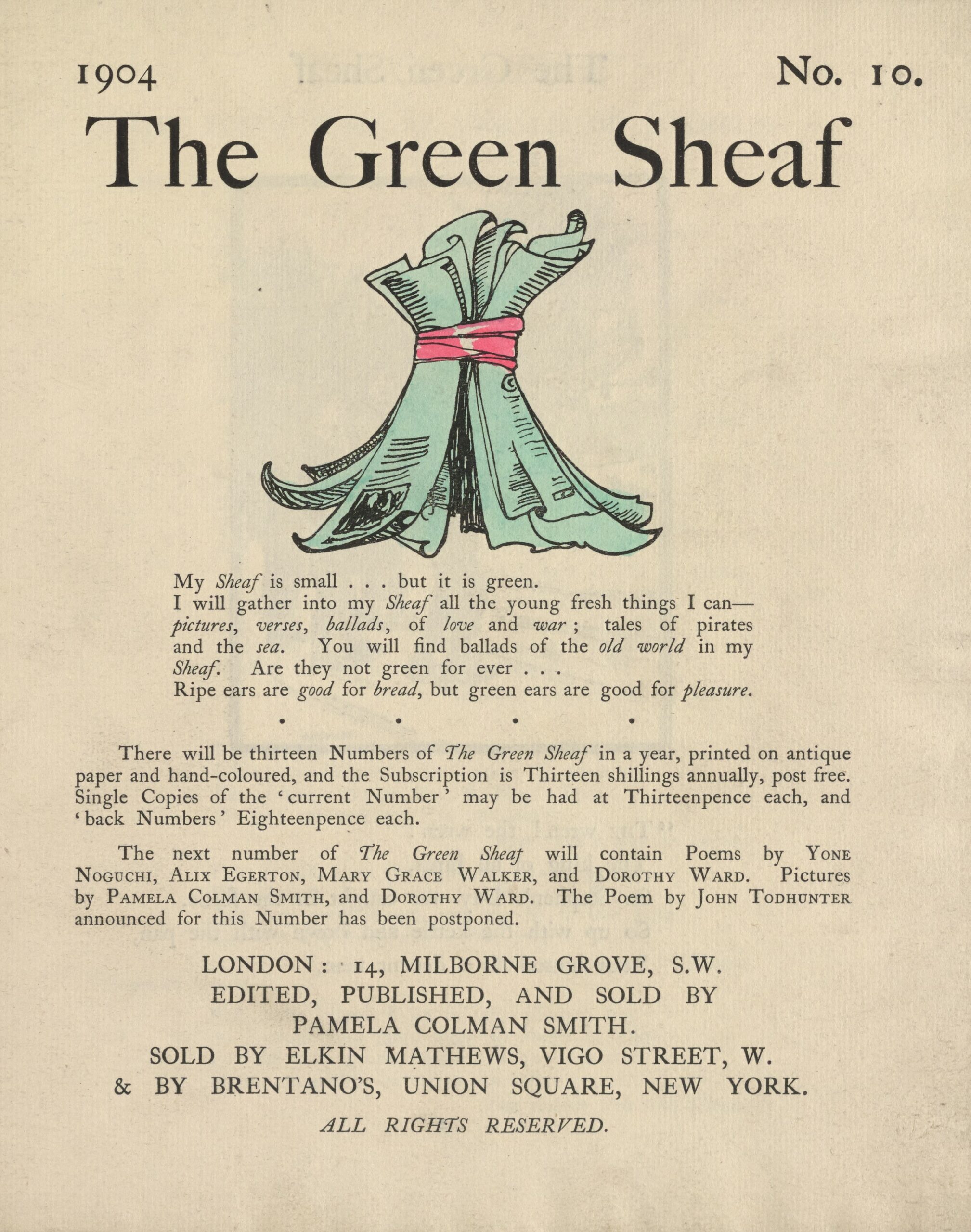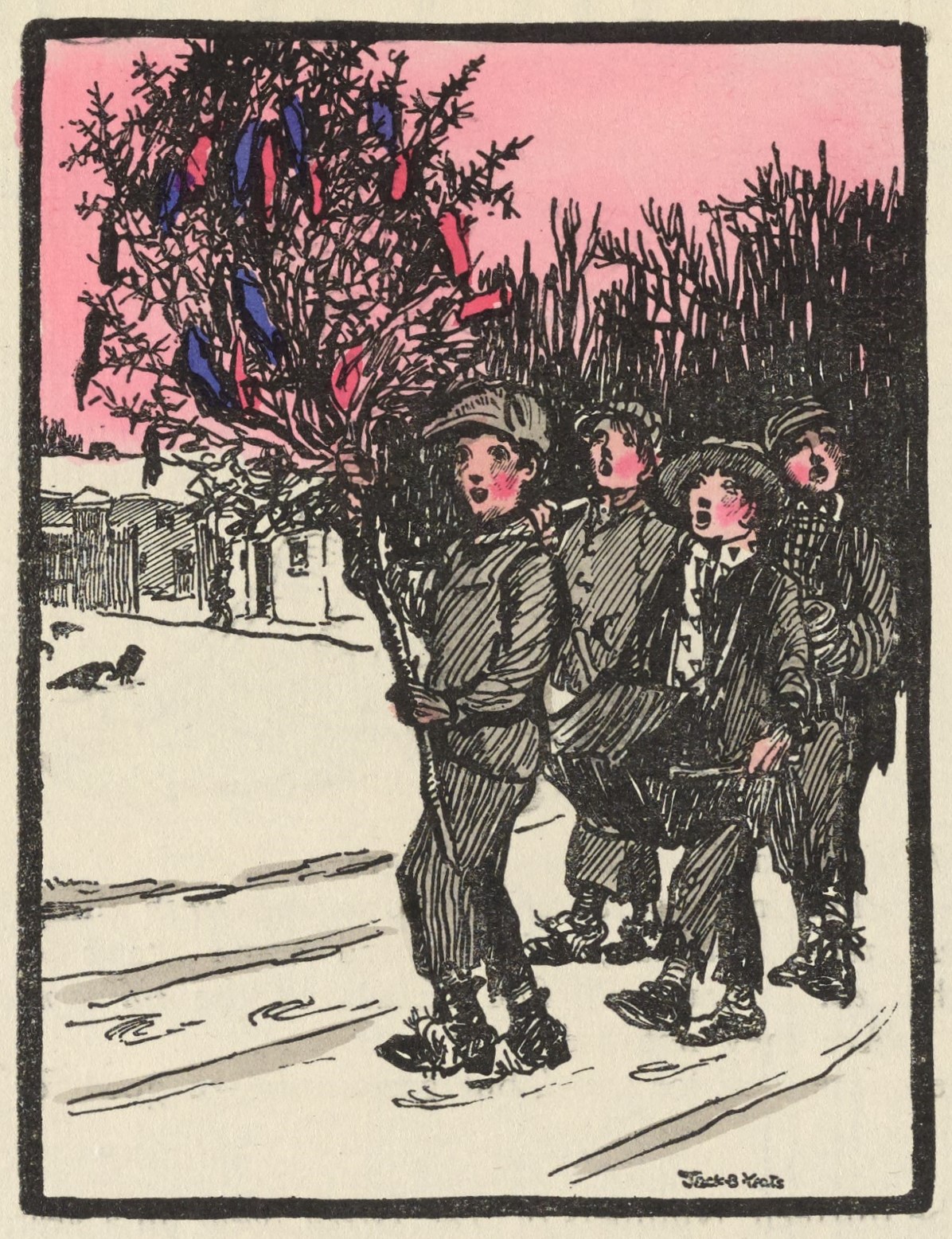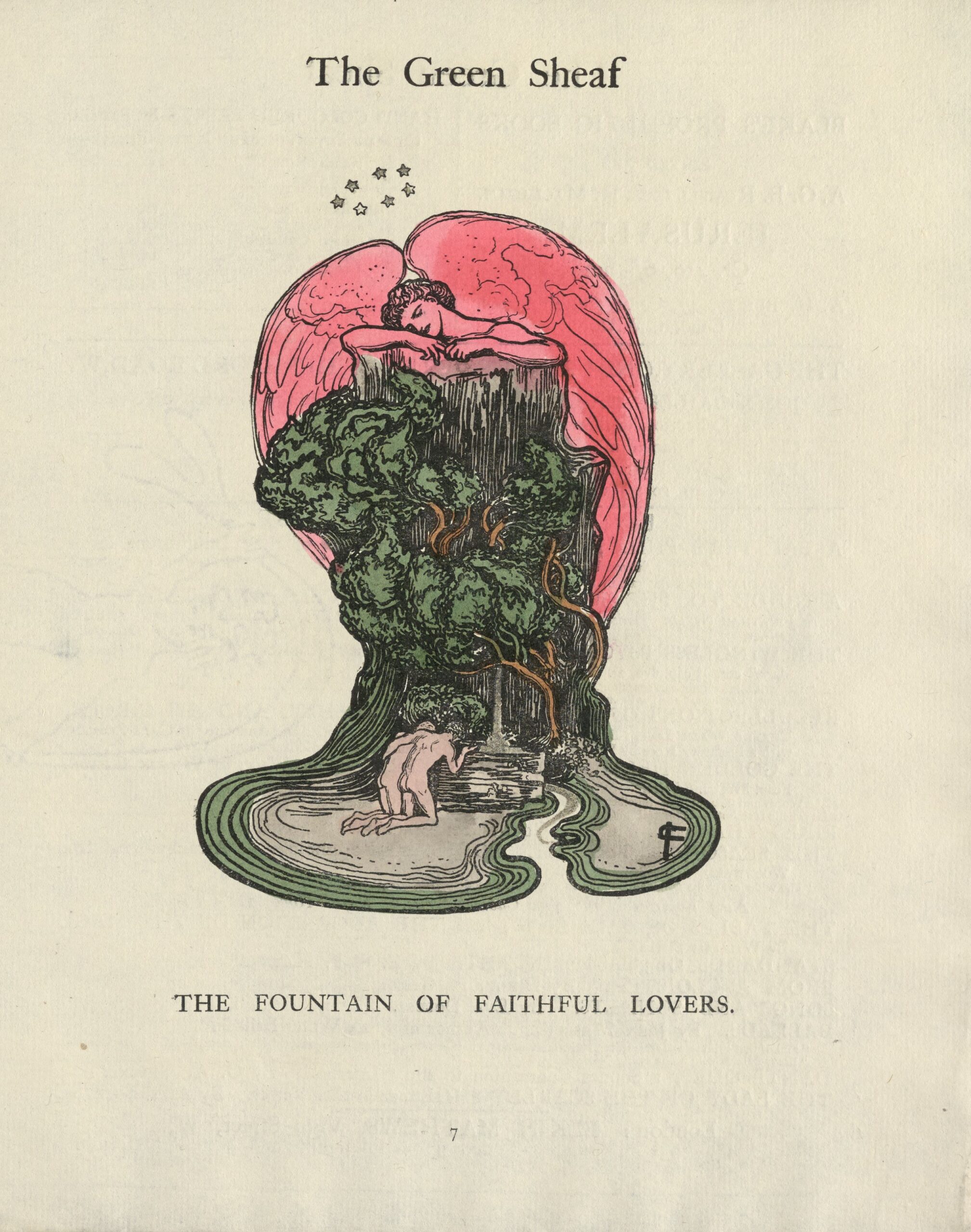TABLE OF CONTENTS
No. 10
Front Cover, by Pamela Colman Smith [i]
Untitled [The wren! The wren!], by Jack B. Yeats 2
Illustration by Jack B. Yeats 2
The Dawn Song by Gerald of Bornhelh, Englished by F. York Powell 3
The Garden, by G.F. 4-5
Illustration by Pamela Colman Smith 5
Lines to the Evening Star, poem by Ernest Radford 6
Rondelet, poem by Ernest Radford 6
Page decoration by Pamela Colman Smith 6
The Fountain of Faithful Lovers, by Cecil French 7
Advertisements 8
THE DAWN SONG BY GERALD OF BORNELH.
Englished by F. York Powell.
Loquitur Vigilator—
O King of Glory! Pure and very Light!
Lord, if it please Thee, God of power and might!
On this my Friend Thy faithful aid bestow
Whom since night fell I have not seen till now:
And soon it will be Dawn.
Fair Friend, whether thou sleep or wake this night,
Sleep no more now, but wake thyself outright;
For in the East I see the Day-star show
That leads the Morn up—well its place I know:
And soon it will be Dawn.
Fair Friend, in this my song to thee I cry,
Sleep no more now, I hear the Bird sing high
That comes thro’ the dark Wood to seek the Day,
And I fear lest the Foe should thee betray:
For soon it will be Dawn.
Fair Friend, rise up and to the window hie
And look forth on the Stars that leave the Sky,
And thou shalt know it is the truth I say;
If thou do not, it is thy Loss alway:
For soon it will be Dawn.
Fair Friend, since that hour I took leave of thee
I have not slept nor stirred from off my knee,
But prayed alway to God, S. Mary’s Son
To give me back my true companion:
And soon it will be Dawn.
Fair Friend, upon the stairs thy charge to me
Was that all sleep I should eschew and flee
And keep good Watch until the Night was done:
But now my Song and Service pass for none:
And soon it will be Dawn.
Respondit Amator—
Fair sweet Friend, I am in such pleasant stay,
As I could wish there were no Dawn or Day—
For the most gentle Dame that e’er was born
Holds me within her arms, wherefore I scorn
The jealous Foe and Dawn.
THE GARDEN.
A story was told to me in Shetland, and this is how it ran:—
Once in Unst there lived a great sea-captain; he had travelled east and west,
he had travelled in the scented south, and his discoveries were many and his
fame great.
He was growing old, and his friends begged him to spend his old age amongst
them in peace, leaving such work as his to the young; but he answered that
he had yet another voyage to make before rest time came, and he manned his ship
and sailed away for the polar lands.
“For what do you adventure, captain?” asked the crew; “to find some fresh
sea-passage, new frost-bound islands; or for seal and white bear skins?”
“For neither fame nor gain,” he answered. “For those I have journeyed
enough, and the end of all is a pleasureless, vain fulfilment. To-day I work for no
end; I sail for the sailing’s sake; and I keep my course for the seaman’s lode-star,
the point that draws the compass and guides my destiny.”
And as he spoke the sky darted pennons of fiery glory, and the wave-crests
caught and gave back the broken splendour of them.
The days passed and grew to weeks and the ship kept its course; the ice-cutter
ploughed through a white world, and night and day merged into a divine twilight.
Seals cried mournful warning to each other across a noiseless dividing space; further
still, and bears, scarcely distinguishable against the snowy landscape, were the only
signs of active life. In time even these gave way to utter blankness and iciness,
and
the frail ship lay between a heaven of tattered fire and an earth of frost.
The crew grew frightened, and would have mutinied, but they had lost their
bearings and dared not sail except under the captain’s guidance. As for him, he
stood motionless at the ship’s head, silent and self-absorbed, and heeded not their
murmurings.
✱ ✱ ✱ ✱ ✱ ✱
There was something magnetic in the air; the heavens changed from dusky red
to purple: the snow shone blue and unearthly. It grew warmer, and faint sweet
odours crept on the breeze. They found themselves land-locked before and on
either hand.
The captain gave orders that anchor should be cast, that he might land.
He went alone, first singling out three men, who if he had not returned in twelve
days were to follow a line of light discernible ahead, where, he said, they would
find him.
The Green Sheaf
The days passed, and there was no sign of his return, and with trembling and
misgiving the men set out.
For three days they followed the gleam, and on the fourth day came upon the
dead body of their master. Strangely enough, it showed no marks of death by frost,
but
was slightly charred.
They were about to raise it, when suddenly before them, raised as in mirage,
appeared a figure of awful beauty, with upraised flaming sword. Behind this loveliness
there seemed to be a gate, set in a white wall overtopped by luxuriant vegetation.
It
was but a momentary vision, then the blinding light faded, and the men in speechless
terror fled.
They reached the ship nearly dead, and weighing anchor all returned home; how,
they knew not, a wind impelled them.
It was in answer to an expressed desire on my part to see the white countries of
the north that the sailor told me this tale; and as a warning to all who would vain-
gloriously search for the magnetic north.
Inaccessible in the present scheme of things, but ever growing within that whiter
walled Garden, there stands, said he, the Tree of Life, guiding the world until the
Great Time comes when we may see it and be immortal.
G. F.
LINES TO THE EVENING STAR.
Maiden, there is pent in thee
Wealth of mirth and melody
That full oft amazes me.
Th’ flavour of the rarest wine
Hath the tiniest geste of thine;
Maiden, maiden, there are Nine
Muses in thee tightly packed,
Each with her own part to act;
As we marvel at the fact,
So we love thee— Maiden mine.
RONDELET.
Think, Love, of me.
Far from thy side to-night;
Think, Love, of me.
So shall I absent see
Pictured upon the night
In thy face Heaven’s light.
Think, Love, of me.
Ernest Radford.
BLAKE’S PROPHETIC BOOKS
EDITED BY
A. G. B. Russell & E. R. Maclagan.
JERUSALEM.
Cr. 4to, 6/- net.
A. H. Bullen, 47, Great Russell Street,
London, W.C.
HAND COLOURED PRINTS by Pamela Colman Smith, of
Miss Ellen Terry:—
as “Nance Oldfield” … Price Is. Post free.
as “Meg Page” … … ” Is. ”
as “‘Portia’ hurrying to
the Railway Station” … ” Is. ”
as “Sans Gêne” … … ” Is. ”
as “Queen Katharine” … ” 2s. 6d. ”
as “Mistress Page” … ” 2s. 6d. ”
as “Hiördis” (in the
Vikings) … … … ” 2s. 6d. ”
Subscribers to The Green Sheaf may obtain “Hiördis”
for Is. Post free.
⎯
THE GALLERY,ONE PRINCE’S TERRACE, HEREFORD ROAD,W.
JOHN BAILLIE requests the honour of a visit. Exhibitions every three weeks.
A fine Collection of Modern Jewellery always on view.
Classes for Enamelling, Metal-work, Carving, Bookcasing, Water Colours, Fan
Painting, Wood Engraving, &c.
Gallery open 10.30 a.m. to 6 p.m.
⎯
From ELKIN MATHEWS’ LIST.
A PAINTER’S PHILOSOPHY: Being a Translation of the “Impressions sur la
Peinture” of Alfred Stevens. By Ina Mary White. With Cover and Title designs by DOUGLAS
STRACHAN, also a Portrait in Photogravure. Pott 8vo, 2s. 6d. net.
A GUIDE TO THE BEST HISTORICAL NOVELS AND TALES. By
Jonathan Nield. Revised throughout and much enlarged. Third and Cheaper Edition. Pott
4to.
4s. net.
THE WINGLESS PSYCHE. (Essays) By Morley Roberts. Author of “Rachel
Marr.” Fcap. 8vo, 2s. 6d. net.
“The writing is supple and sparkling.”—Times.
“Exquisitely written, tinged with philosophic melancholy.”—Vanity Fair.
RECOLLECTIONS OF DANTE GABRIEL ROSSETTI AND HIS CIRCLE.
Cheyne Walk Life. By the late Henry Treffry Dunn. Edited and Annotated by Gale Pedrick,
with a Prefatory Note by W. M. Rossetti. Photogravure and other Illustrations. Cr.
8vo, 3s. 6d. net.
THE GOLDEN HELM AND OTHER VERSE. By Wilfrid Wilson Gibson,
Fcap. 8vo, 2s. 6d. net.
“Words and thought move together in noble harmony, and the work is the outcome of
passion and imagination, controlled by a
wise artistic restraint.”—Glasgow Herald.
FIRES THAT SLEEP. By Gladys Schumacher. Cr. 8vo, 3s. 6d. net.
THE SEASONS WITH THE POETS. An Anthology edited by Ida
Woodward. Pott 4to, 5s. net.
“The wideness of the range adds to the charm of the selections.”—Court Journal.
New Volumes in the Vigo Cabinet Series. Royal 16mo, Is. net each.
THE TABLES OF THE LAW; and THE ADORATION OF THE MAGI.
By William Butler Yeats.
STANDARDS OF TASTE IN ART. By E. S. P. Haynes.
FROM A CLOISTER. By Elizabeth Gibson.
SONGS AND SONNETS. By Eva Dobell.
BALLADS. By John Masefield. Author of “ Salt Water Ballads.”
“Full of that grimness of adventure that comes nowadays to save romance from mere
ethereal dissipations.”—Manchester Guardian.
“Brave ballads with a line swing.”—Academy.
DANTESQUES, a Sonnet Companion to the Inferno. By George A. Greene,
THE LADY OF THE SCARLET SHOES, and other Verses. By Alix Egerton.
⎯
London: ELKIN MATHEWS, Vigo Street, W.
MLA citation:
The Green Sheaf, No. 10, 1904. Green Sheaf Digital Edition, edited by Lorraine Janzen Kooistra. Yellow Nineties 2.0, Toronto Metropolitan University Centre for Digital Humanities, 2022. https://1890s.ca/gsv10_all/




